七年级英语语法大全
七年级英语语法知识总结(10篇)
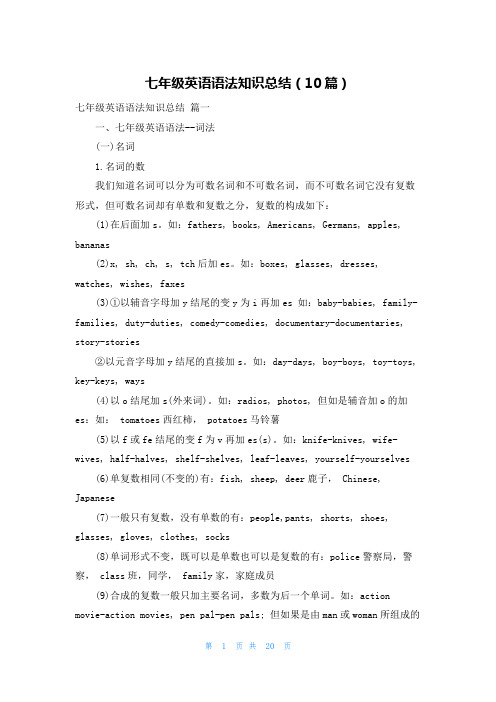
七年级英语语法知识总结(10篇)七年级英语语法知识总结篇一一、七年级英语语法--词法(一)名词1.名词的数我们知道名词可以分为可数名词和不可数名词,而不可数名词它没有复数形式,但可数名词却有单数和复数之分,复数的构成如下:(1)在后面加s。
如:fathers, books, Americans, Germans, apples, bananas(2)x, sh, ch, s, tch后加es。
如:boxes, glasses, dresses, watches, wishes, faxes(3)①以辅音字母加y结尾的变y为i再加es 如:baby-babies, family-families, duty-duties, comedy-comedies, documentary-documentaries, story-stories②以元音字母加y结尾的直接加s。
如:day-days, boy-boys, toy-toys, key-keys, ways(4)以o结尾加s(外来词)。
如:radios, photos, 但如是辅音加o的加es:如: tomatoes西红柿, potatoes马铃薯(5)以f或fe结尾的变f为v再加es(s)。
如:knife-knives, wife-wives, half-halves, shelf-shelves, leaf-leaves, yourself-yourselves (6)单复数相同(不变的)有:fish, sheep, deer鹿子, Chinese, Japanese(7)一般只有复数,没有单数的有:people,pants, shorts, shoes, glasses, gloves, clothes, socks(8)单词形式不变,既可以是单数也可以是复数的有:police警察局,警察, class班,同学, family家,家庭成员(9)合成的复数一般只加主要名词,多数为后一个单词。
七年级全册英语语法大全
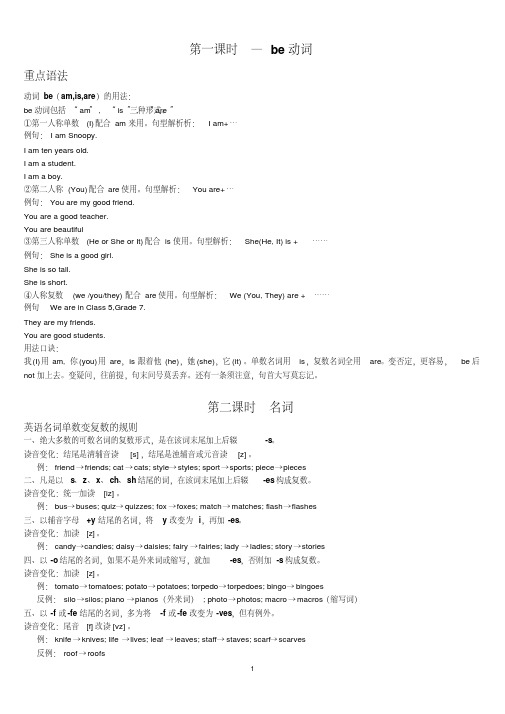
We (You, They) are +
……
They are my friends. You are good students. 用法口诀: 我 (I) 用 am, 你 (you) 用 are,is 跟着他 (he),她 (she),它 (it) 。单数名词用
is ,复数名词全用
are。变否定,更容易,
十九、若表达具体数目,要借助数量词 例: pair( 对,双 ); suit( 套 ); a pair of glasses; two pairs of trousers
二十、另外还有一些名词,其复数形式有时可表示特别意思, 例: goods 货物, waters 水域, fishes(各种)鱼
二十一、除人民币元、角、分外,美元、英镑、法郎等都有复数形式。
例: fish → fish; sheep→ sheep; cattle→ cattle; deer→ deer; salmon→ salmon 十二、极少数单词,其复数形式没有任何规律。 读音变化:没有规律。
例: man→ men; woman →women; child →children; person → people; ox → oxen 十三、一些单数词得加 en 才能变成复数词:
形容词性物主代词 (my/your/his/her/its/our/their)+ 名词 而名词性物主代词则相当于形容词性物主代词 +名词 ,故其后不必加名词。如:
Is this your book?
No,, it isn?t, it?s hers(her book) This pen is mine.
1.in; on; at 用在时间词前,表“在”
第四课时 介词知识点
七年级英语语法大全(动词、名词所有格,一般现在时)

七年级英语语法大全(动词、名词所有格,一般现在时)一. 动词be(is,am,are)的用法我(I)用am, 你(you)用are,is跟着他(he)、她(she)、它(it)。
单数名词用is,复数名词全用are。
变否定,更容易,be后not加上去。
变疑问,往前提,句末问号莫丢弃。
还有一条须注意,句首大写莫忘记。
二. 不定冠词a和ana和an都是不定冠词,表示一(个,支,本,块……)的意思,但不强调数量概念,而是强调类别,用来限定名词。
a用在辅音音素开头的单数名词前,如:a pencil(一支铅笔),a book(一本书);an用在元音音素开头的名词前,如an eraser(一块橡皮)。
如果名词前有修饰语,用a还是用an,则以该修饰语的第一音素决定用a还是用an。
如:a clock 一座钟an old clock 一座旧钟a book 一本书an English book 一本英语书a nice apple 一个可爱的苹果an apple 一个苹果三. this,that和it用法(1)this和that是指示代词,it是人称代词。
(2)距离说话人近的人或物用this, 距离说话人远的人或物用that。
如:This is a flower. 这是一朵花。
(近处)That is a tree. 那是一棵树。
(远处)(3)放在一起的两样东西,先说this, 后说that。
如:This is a pen. That is a pencil. 这是一支钢笔。
那是一支铅笔。
(4)向别人介绍某人时说This is…, 不说That is…。
如:This is Helen. Helen, this is Tom. 这是海伦。
海伦,这是汤姆。
(5)This is 不能缩写, 而That is可以缩写。
如:This is a bike. That’s a car. 这是一辆自行车。
那是一辆轿车。
(6)打电话时,介绍自己用this, 询问对方用that。
初中英语七年级语法大全
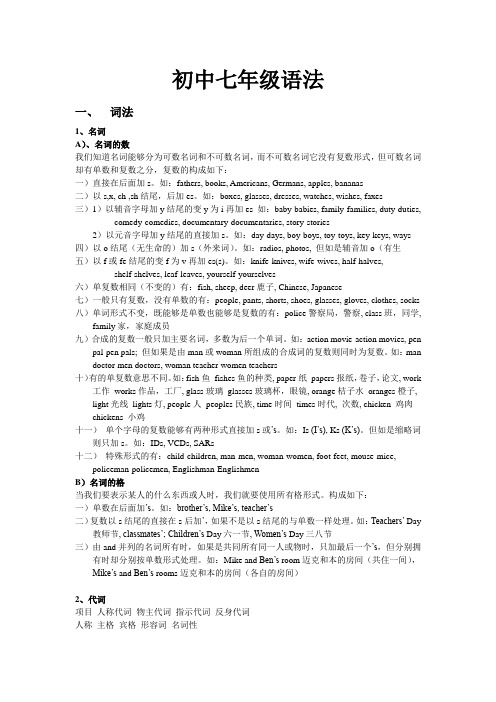
初中七年级语法一、词法1、名词A)、名词的数我们知道名词能够分为可数名词和不可数名词,而不可数名词它没有复数形式,但可数名词却有单数和复数之分,复数的构成如下:一)直接在后面加s。
如:fathers, books, Americans, Germans, apples, bananas二)以s,x, ch ,sh结尾,后加es。
如:boxes, glasses, dresses, watches, wishes, faxes三)1)以辅音字母加y结尾的变y为i再加es 如:baby-babies, family-families, duty-duties, comedy-comedies, documentary-documentaries, story-stories2)以元音字母加y结尾的直接加s。
如:day-days, boy-boys, toy-toys, key-keys, ways 四)以o结尾(无生命的)加s(外来词)。
如:radios, photos, 但如是辅音加o(有生五)以f或fe结尾的变f为v再加es(s)。
如:knife-knives, wife-wives, half-halves, shelf-shelves, leaf-leaves, yourself-yourselves六)单复数相同(不变的)有:fish, sheep, deer鹿子, Chinese, Japanese七)一般只有复数,没有单数的有:people, pants, shorts, shoes, glasses, gloves, clothes, socks 八)单词形式不变,既能够是单数也能够是复数的有:police警察局,警察, class班,同学, family家,家庭成员九)合成的复数一般只加主要名词,多数为后一个单词。
如:action movie-action movies, pen pal-pen pals; 但如果是由man或woman所组成的合成词的复数则同时为复数。
最全七年级英语语法知识点汇总

最全七年级英语语法知识点汇总英语语法虽然是从简单的一些日常用语出发的,但语法中常会有一些知识点看起来很细小,容易被忽视,但这些知识点掌握不熟练,往往会造成一些语法应用上的错误。
接下来是为大家整理的最全(七班级英语)语法知识点汇总,希望大家喜欢!最全七班级英语语法知识点汇总一1.陈述句肯定陈述句a)Thisisabook.(be动词)b)Helooksveryyoung.(连系动词)c)Iwantasweatlikethis.(实义动词)d)Icanbringsomethingstoschool.(情态动词)e)There’sacomputeronmydesk.(Therebe结构)否定陈述句a)Thesearen’ttheirbooks.b)Theydon’tlooknice.c)Katedoesn’tgotoNo.4MiddleSchool.d)Katecan’tfindherdoll.e)Thereisn’tacathere.(=There’snocathere.)2.祈使句肯定祈使句a)Pleasegoandasktheman.b)Let’slearnEnglish!c)Comein,please.否定祈使句a)Don’tbelate.b)Don’thurry.3.疑问句1)一般疑问句a)IsJimastudent?b)CanIhelpyou?c)Doesshelikesalad?d)DotheywatchTV?e)Isshereading?肯定回答:a)Yes,heis.b)Yes,youcan.c)Yes,shedoes.d)Yes,theydo.e)Yes,sheis.否定回答:a)No,heisn’t.b)No,youcan’t.c)No,shedoesn’t.d)No,theydon’t.e)No,shei sn’t.2)选择疑问句Isthetablebigorsmall?回答It’sbig./It’ssmall.3)特殊疑问句①问年龄HowoldisLucy?Sheistwelve.②问种类Whatkindofmoviesdoyoulike?Ilikeactionmoviesandcomedies.③问身体状况Howisyouruncle?Heiswell/fine.④问方式Howdo/canyouspellit?L-doubleO-K.Howdowecontactyou?Mye-*******************************.⑤问原因Whydoyouwanttojointheclub?⑥问时间What’sthetime?(=Whattimeisit?)It’saquartertotena.m..Whattimedoyouusuallygetup,Rick?Atfiveo’clock.Whendoyouwanttogo?Let’sgoat7:00.⑦问地方Where’smybackpack?It’sunderthetable.⑧问颜色Whatcolorarethey?Theyarelightblue.What’syourfavouritecolor?It’sblack.⑨问人物Who’sthat?It’smysister.Whoistheboyinblue?Mybrother.Whoisn’tatschool?PeterandEmma.WhoareLisaandTimtalkingto?⑩问东西What’sthis/that(inEnglish)?It’sapencilcase.Whatelsecanyouseeinthepicture?Icanseesomebroccoli,strawberriesandh amburgers.11问姓名What’syouraunt’sname?HernameisHelen./She’sHelen.What’syourfirstname?Myfirstname’sBen.What’syourfamilyname?Myfamilyname’sSmith.12问哪一个Whichdoyoulike?Ilikeoneinthebox.13问字母Whatletterisit?It’sbigD/smallf.14问价格Howmucharethesepants?They’re15dollars.15问电话号码What’syourphonenumber?It’s576-8349.16问谓语(动作)What’shedoing?He’swatchingTV.17问职业(身份)Whatdoyoudo?I’mateacher.What’syourfather?He’sadoctor.最全七班级英语语法知识点汇总二首先要介绍的就是关于动词be(is,am,are)的用法,动词在一个(句子)中很重要,对于英语来说be(is,am,are)更是常常用到,学会be 的用法就是学好英语的根基。
七年级英语语法知识点总结
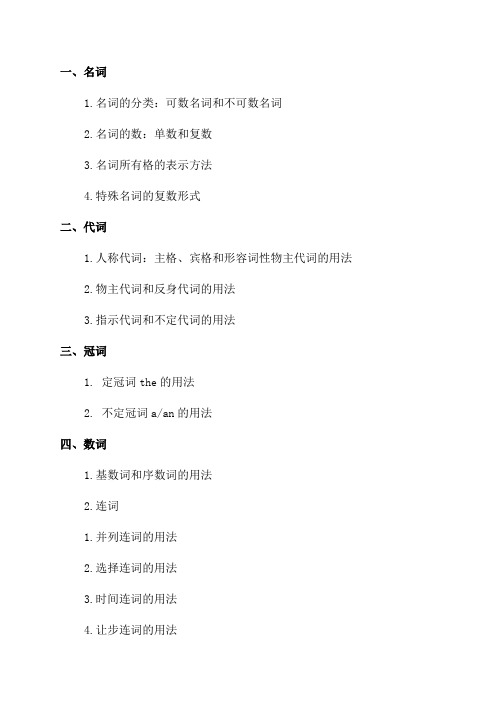
一、名词1.名词的分类:可数名词和不可数名词2.名词的数:单数和复数3.名词所有格的表示方法4.特殊名词的复数形式二、代词1.人称代词:主格、宾格和形容词性物主代词的用法2.物主代词和反身代词的用法3.指示代词和不定代词的用法三、冠词1. 定冠词the的用法2. 不定冠词a/an的用法四、数词1.基数词和序数词的用法2.连词1.并列连词的用法2.选择连词的用法3.时间连词的用法4.让步连词的用法5.结果连词的用法五、形容词和副词1.形容词的用法和比较级、最高级的构成2.副词的用法和比较级、最高级的构成六、时间状语从句1.引导时间状语从句的连词的用法2.时间状语从句的时态和语序七、地点状语从句1.引导地点状语从句的连词的用法八、因果状语从句1.引导因果状语从句的连词的用法九、条件状语从句1.引导条件状语从句的连词的用法2.条件状语从句的时态和语序十、目的状语从句1.引导目的状语从句的连词的用法十一、同位语从句1.同位语从句的引导词十二、定语从句1.引导定语从句的关系代词和关系副词的用法十三、省略句1.句子中的省略现象十四、被动语态1.被动语态的构成和用法十五、宾语从句1.引导宾语从句的连词的用法十六、反意疑问句1.反意疑问句的构成和用法十七、动词时态和语态1.一般现在时、一般过去时和一般将来时的构成和用法2.现在进行时和过去进行时的构成和用法3.现在完成时和过去完成时的构成和用法4.一般将来时和一般过去将来时的构成和用法。
七年级英语语法归纳
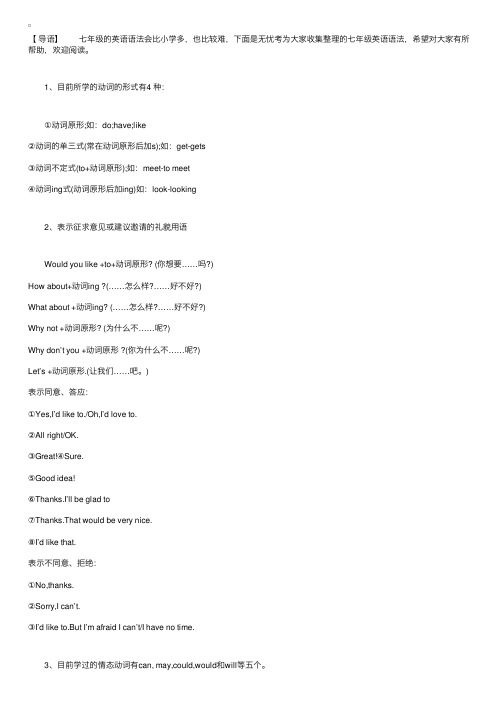
【导语】 七年级的英语语法会⽐⼩学多,也⽐较难,下⾯是⽆忧考为⼤家收集整理的七年级英语语法,希望对⼤家有所帮助,欢迎阅读。
1、⽬前所学的动词的形式有4 种: ①动词原形;如:do;have;like②动词的单三式(常在动词原形后加s);如:get-gets③动词不定式(to+动词原形);如:meet-to meet④动词ing式(动词原形后加ing)如:look-looking 2、表⽰征求意见或建议邀请的礼貌⽤语 Would you like +to+动词原形? (你想要……吗?)How about+动词ing ?(……怎么样?……好不好?)What about +动词ing? (……怎么样?……好不好?)Why not +动词原形? (为什么不……呢?)Why don’t you +动词原形 ?(你为什么不……呢?)Let’s +动词原形.(让我们……吧。
)表⽰同意、答应:①Yes,I’d like to./Oh,I’d love to.②All right/OK.③Great!④Sure.⑤Good idea!⑥Thanks.I’ll be glad to⑦Thanks.That would be very nice.⑧I’d like that.表⽰不同意、拒绝:①No,thanks.②Sorry,I can’t.③I’d like to.But I’m afraid I can’t/I have no time. 3、⽬前学过的情态动词有can, may,could,would和will等五个。
学好情态动词必须把握三个⽤法:①后必须跟动词原形 ;②没有三单式(其后不能加s);③可以把情态动词提到句⾸构成疑问句;可以在情态动词后⾯加上not构成否定句。
4、⽬前学过的后跟动词不定式(to+动词原形)的有: ①would like to+动词原形(想要做某事);want to+动词原形(想要做某事);②forget to+动词原形(忘记要做某事);③like to +动词原形(喜欢做某事);love to +动词原形(喜欢做某事)④ask sb. to +动词原形.(请/叫某⼈做某事)tell sb. to +动词原形.(告诉/叫某⼈做某事)would like sb. to +动词原形.(想叫某⼈做某事)want sb. to +动词原形.(想叫某⼈做某事)⑤have to +动词原形(必须/不得不做某事)⑥Nice/Glad/happy to +动词原形(很⾼兴做某事)如:Nice to meet you.I’m glad to be here. 5、⽬前学过的后跟动词原形的有: ①情态动词:can,may,could,would,will后;②助动词do,don’t,does,doesn’t后(does,doesn’t⼀出现,三单式要滚蛋); ③动词please(请)后:如:Please tell him about the picnic.④短语Why not…/Why don’t you…后;⑤动词let 后;如:Let Jane help you. Let’s go home.⑥动词help后,也可带to;如:Let’s help Maria (to) carry water.⑦祈使句以动词原形开头,如:Have a seat , please.请坐下。
初一英语英语语法总结(共51张)
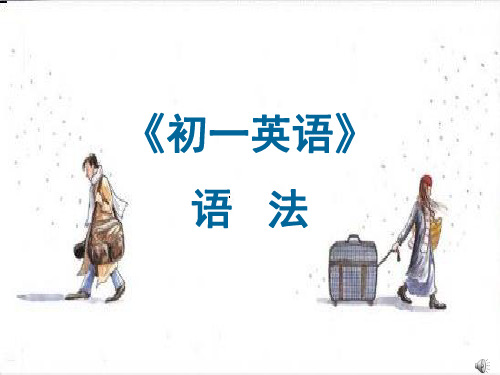
German.
双重所有格
所有’s格结的构形也式可以用于 “of”结构之后,如: a friend of
does
did
done doing
have learn
has learns
had
had having
learned /learnt
learned /learnt
learning
第三人称单数现在式
情况 变化规则
例词
一般情况
结尾为 s,x,sh,ch,o 结尾为辅音
字母+y
+s
+es 变y为 i+es
Be动词
am, is, are was, were
been
is 1.He ________ very good at English.
Practise
Were are 2.My father and I ________ going to Beijing next month.
was 3.________ you on duty the day before yesterday?
2. 在某些度量表示法中:
We have PE lessons three times a week.
3. 用在单数的表语名词前,以表示职业、行 业、宗教、等级等。
George wants to be an engineer.
4. 在以what引导的感叹句中,单数的可数名 词前。
七年级英语语法归纳总结

七年级英语语法归纳总结七年级英语语法归纳总结如下:1. 动词的时态:- 现在时:表示经常性的动作、习惯、真理和现在的状态等。
- 过去时:表示过去发生的动作或状态。
- 将来时:表示将来要发生的动作或状态。
2. 一般现在时:- 肯定句:主语+动词原形+其他。
- 否定句:主语+do not/does not+动词原形+其他。
- 疑问句:Do/Does+主语+动词原形+其他?3. 一般过去时:- 肯定句:主语+动词过去式+其他。
- 否定句:主语+did not+动词原形+其他。
- 疑问句:Did+主语+动词原形+其他?4. 一般将来时:- 肯定句:主语+will+动词原形+其他。
- 否定句:主语+will not+动词原形+其他。
- 疑问句:Will+主语+动词原形+其他?5. 名词的单复数:- 一般情况下,名词在单数形式后面加-s来表示复数。
- 以s、sh、ch、x结尾的名词,在单数形式后面加-es来表示复数。
- 以辅音字母+y结尾的名词,在单数形式后面去y,变成i,再加-es来表示复数。
- 以o结尾的名词,有些加-s,有些加-es来表示复数。
6. 形容词的比较级和最高级:- 一般情况下,形容词的比较级在词尾加-er,最高级在词尾加-est。
- 以e结尾的形容词,在词尾直接加-r,-st来表示比较级和最高级。
- 以辅音字母+y结尾的形容词,在词尾去y,变成i,再加-er,-est来表示比较级和最高级。
- 部分形容词的比较级和最高级有不规则变化。
7. 代词的用法:- 主格代词:作主语或作表语。
- 宾格代词:作动词或介词的宾语。
- 形容词性物主代词:用来表示所有关系。
- 名词性物主代词:作主语、宾语或表语。
- 反身代词:表示自己。
8. 冠词的用法:- 定冠词:表示特指的人或物,用the。
- 不定冠词:表示泛指的人或物,用a/an。
- 零冠词:不用任何冠词。
9. 介词的用法:- 表示时间:in/on/at。
七年级英语语法知识总结(精选6篇)
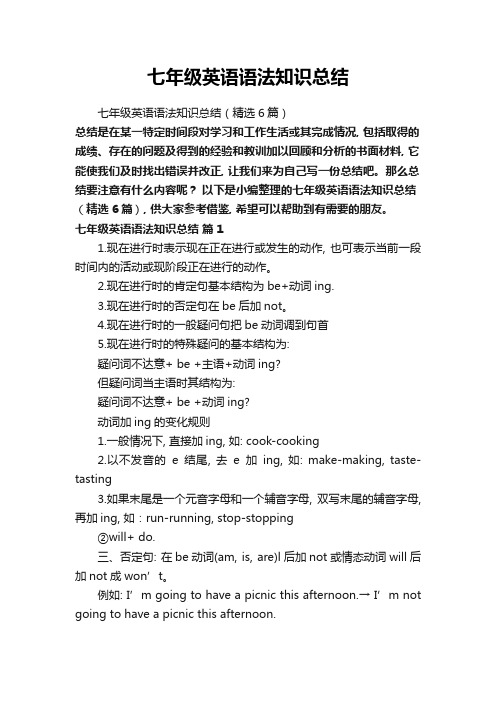
七年级英语语法知识总结七年级英语语法知识总结(精选6篇)总结是在某一特定时间段对学习和工作生活或其完成情况, 包括取得的成绩、存在的问题及得到的经验和教训加以回顾和分析的书面材料, 它能使我们及时找出错误并改正, 让我们来为自己写一份总结吧。
那么总结要注意有什么内容呢?以下是小编整理的七年级英语语法知识总结(精选6篇), 供大家参考借鉴, 希望可以帮助到有需要的朋友。
七年级英语语法知识总结篇11.现在进行时表示现在正在进行或发生的动作, 也可表示当前一段时间内的活动或现阶段正在进行的动作。
2.现在进行时的肯定句基本结构为be+动词ing.3.现在进行时的否定句在be后加not。
4.现在进行时的一般疑问句把be动词调到句首5.现在进行时的特殊疑问的基本结构为:疑问词不达意+ be +主语+动词ing?但疑问词当主语时其结构为:疑问词不达意+ be +动词ing?动词加ing的变化规则1.一般情况下, 直接加ing, 如: cook-cooking2.以不发音的e结尾, 去e加ing, 如: make-making, taste- tasting3.如果末尾是一个元音字母和一个辅音字母, 双写末尾的辅音字母, 再加ing, 如:run-running, stop-stopping②will+ do.三、否定句: 在be动词(am, is, are)l后加not或情态动词will后加not成won’t。
例如: I’m going to have a picnic this afternoon.→ I’m not going to have a picnic this afternoon.四、一般疑问句: be或will提到句首, some改为any, and改为or, 第一二人称互换。
例如: We are going to go on an outing this weekend.→ Are you going to go on an outing this weekend?五、对划线部分提问。
七年级英语语法归纳

一、七年级英语语法归纳(一)be动词。
1、be动词概说。
(包括am, are, is)be ①连系动词,本身有词义“是”,在句子中和其后的表语一起构成谓语。
e.g. I am tall.(表语)②助动词,无词义。
e.g. He is playing football.2、be动词的用法。
am →主语是单数第一人称(即I)。
e.g. I am…be are →单数第二人称及所有复数。
e.g. You are…The coats are…is →单数第三人称及不可数名词。
e.g. Your father is…The money is…3、否定句式(即改否定句):在be动词之后+not, 句子其它部位不变。
e.g. He is not a teacher.4、缩写形式。
①主语+be,缩写be第一个字母为’,再与主语合并。
e.g. you are →you’re Jack is →Jack’s②be+not否定形式的缩写,缩写not中“o”为’, 再与be合并。
e.g. is not→isn’t are not→aren’t③不能缩写的情况:this is, these are, those are, am not及缩略的肯定回答。
e.g. Yes, I am. (I’m误)5、含be动词句子的疑问句型转换。
①一般疑问句:将be动词提前,其它照抄不变,最后+?,读升调。
(一般第一人称改为第二人称)e.g. The man in the car is her father. →Is the man in the car her father?I’m a middle school student. →Are you a middle school student?②一般疑问句的肯否定回答。
肯定回答:Yes, 主语+be. 否定回答:No, 主语+be+not.e.g. Is he old? Are you a new student? Is your father at home?Yes, he is. Yes, I am. Yes, he is.No, he is not.(isn’t)No, I’m not.No, he is not.(isn’t)注意:①主语必须用代词回答;②肯定回答不能缩写;③回答第二人称,用第一人称回答。
七年级语法大全
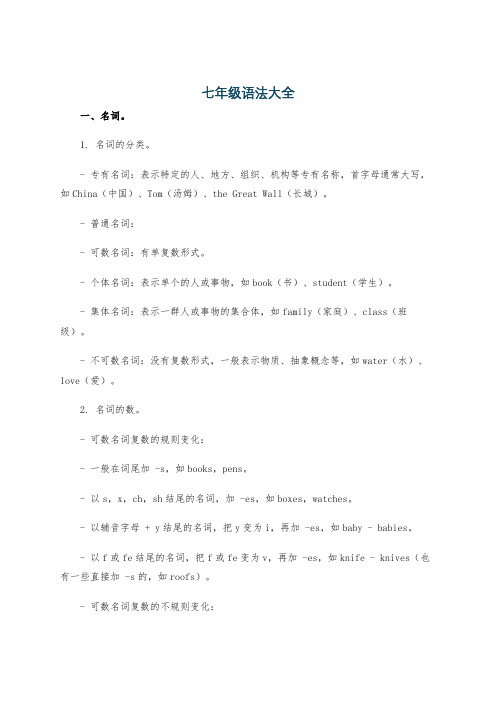
七年级语法大全一、名词。
1. 名词的分类。
- 专有名词:表示特定的人、地方、组织、机构等专有名称,首字母通常大写,如China(中国)、Tom(汤姆)、the Great Wall(长城)。
- 普通名词:- 可数名词:有单复数形式。
- 个体名词:表示单个的人或事物,如book(书)、student(学生)。
- 集体名词:表示一群人或事物的集合体,如family(家庭)、class(班级)。
- 不可数名词:没有复数形式,一般表示物质、抽象概念等,如water(水)、love(爱)。
2. 名词的数。
- 可数名词复数的规则变化:- 一般在词尾加 -s,如books,pens。
- 以s,x,ch,sh结尾的名词,加 -es,如boxes,watches。
- 以辅音字母 + y结尾的名词,把y变为i,再加 -es,如baby - babies。
- 以f或fe结尾的名词,把f或fe变为v,再加 -es,如knife - knives(也有一些直接加 -s的,如roofs)。
- 可数名词复数的不规则变化:- 单复数同形,如fish(表示鱼的种类时可数,复数形式还是fish;表示鱼的条数时,单复数同形)、sheep。
- 特殊变化,如man - men,woman - women,child - children。
3. 名词所有格。
- 有生命的名词所有格:- 一般在名词后加's,如Tom's book(汤姆的书)。
- 以s结尾的复数名词,只加',如students' classroom(学生们的教室)。
- 表示两者或两者以上共有时,只在最后一个名词后加's,如Lucy and Lily's mother(露西和莉莉的妈妈);表示各自拥有时,每个名词后都加's,如Lucy's and Lily's bags(露西的包和莉莉的包)。
- 无生命的名词所有格:- 用“of+名词”结构,如the door of the room(房间的门)。
七年级英语语法大全

七年级英语语法大全一.动词be(is,am,are)的用法我(I)用am, 你(you)用are,is跟着他(he),她(she),它(it)。
单数名词用is,复数名词全用are。
变否定,更容易,be 后not加上去。
变疑问,往前提,句末问号莫丢弃。
还有一条须注意,句首大写莫忘记。
二.this,that和it用法(1)this和that是指示代词,it是人称代词。
(2)距离说话人近的人或物用this, 距离说话人远的人或物用that。
如:This is a flower. 这是一朵花。
(近处) That is a tree. 那是一棵树。
(远处)(3)放在一起的两样东西,先说this, 后说that。
如:This is a pen. That is a pencil. 这是一支钢笔。
那是一支铅笔。
(4)向别人介绍某人时说This is…, 不说That is…。
如:This is Helen. Helen, this is Tom. 这是海伦,海伦,这是汤姆。
(5)This is 不能缩写, 而That is可以缩写。
如:This is a bike. That’s a ca r. 这是一辆自行车。
那是一辆轿车。
(6)打电话时,介绍自己用this, 询问对方用that。
如:—Hello! Is that Miss Green? 喂,是格林小姐吗?—Yes, this is. Who’s that? 是的,我是,你是谁?注意:虽然汉语中使用“我”和“你”,但英语中打电话时绝不可以说:I am…, Are you…?/Who are you?(7)在回答this或that作主语的疑问句时, 要用it代替this或that。
如:①—Is this a notebook? 这是笔记本吗?—Yes, it is. 是的,它是。
②—What’s that? 那是什么?—It’s a kite. 是只风筝。
三.these和those用法this, that, these和those是指示代词,these是this的复数形式,指时间,距离较近的或下面要提到的人或事;those是that 的复数形式,指时间、距离较远或前面已经提到过的人或事物。
七年级英语全册所有语法知识点
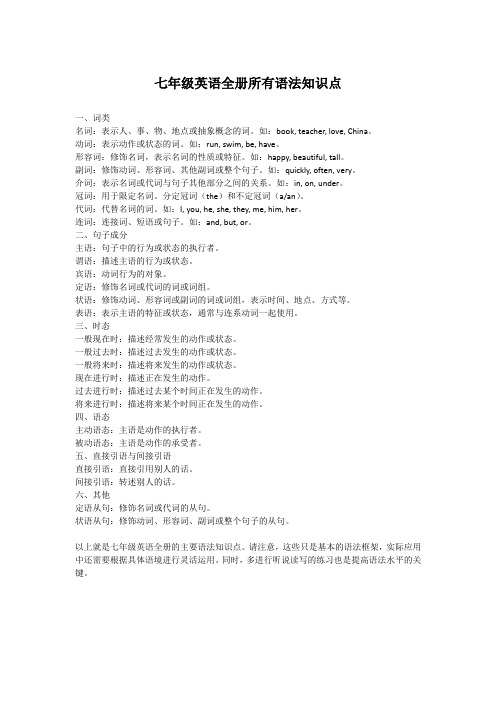
七年级英语全册所有语法知识点一、词类名词:表示人、事、物、地点或抽象概念的词。
如:book, teacher, love, China。
动词:表示动作或状态的词。
如:run, swim, be, have。
形容词:修饰名词,表示名词的性质或特征。
如:happy, beautiful, tall。
副词:修饰动词、形容词、其他副词或整个句子。
如:quickly, often, very。
介词:表示名词或代词与句子其他部分之间的关系。
如:in, on, under。
冠词:用于限定名词。
分定冠词(the)和不定冠词(a/an)。
代词:代替名词的词。
如:I, you, he, she, they, me, him, her。
连词:连接词、短语或句子。
如:and, but, or。
二、句子成分主语:句子中的行为或状态的执行者。
谓语:描述主语的行为或状态。
宾语:动词行为的对象。
定语:修饰名词或代词的词或词组。
状语:修饰动词、形容词或副词的词或词组,表示时间、地点、方式等。
表语:表示主语的特征或状态,通常与连系动词一起使用。
三、时态一般现在时:描述经常发生的动作或状态。
一般过去时:描述过去发生的动作或状态。
一般将来时:描述将来发生的动作或状态。
现在进行时:描述正在发生的动作。
过去进行时:描述过去某个时间正在发生的动作。
将来进行时:描述将来某个时间正在发生的动作。
四、语态主动语态:主语是动作的执行者。
被动语态:主语是动作的承受者。
五、直接引语与间接引语直接引语:直接引用别人的话。
间接引语:转述别人的话。
六、其他定语从句:修饰名词或代词的从句。
状语从句:修饰动词、形容词、副词或整个句子的从句。
以上就是七年级英语全册的主要语法知识点。
请注意,这些只是基本的语法框架,实际应用中还需要根据具体语境进行灵活运用。
同时,多进行听说读写的练习也是提高语法水平的关键。
初一英语语法大全

初一英语语法大全1. 词性(1)名词(Noun):表示人、物、地点、动物等具体或抽象的事物。
名词可以用来表示主语、宾语、定语和补语等。
例句:I have a book.(我有一本书)(2)代词(Pronoun):代替名词的词语,用于避免重复,分为人称代词、物主代词、指示代词、疑问代词和不定代词等。
例句:He is my friend.(他是我的朋友)(3)动词(Verb):表示动作、状态或存在的词语。
分为及物动词和不及物动词。
例句:I like playing basketball.(我喜欢打篮球)(4)形容词(Adjective):修饰名词或代词,描述它们的性质或特征。
例句:She has a beautiful dress.(她有一件漂亮的裙子)(5)副词(Adverb):修饰动词、形容词、副词等,描述它们的程度、方式、时间等。
例句:He speaks English fluently.(他讲英语流利)(6)介词(Preposition):表示方位、时间、方式等概念,连接名词或代词与其他词语。
例句:She is studying in the library.(她正在图书馆学习)(7)连词(Conjunction):连接词、短语或从句,表示逻辑关系。
例句:I want to go to the park, but it's raining.(我想去公园,但是下雨了)(8)感叹词(Interjection):表示强烈的情感或意思的词语。
例句:Oh no! I forgot my keys.(哦,不!我忘记带钥匙了)2. 句子成分(1)主语(Subject):句子中执行动作的主要对象,通常是名词、代词、动名词短语等。
例句:Tom is playing football.(汤姆在踢足球)(2)谓语(Predicate):句子中说明主语动作或状态的部分,通常是动词或动词短语。
例句:She likes to read books.(她喜欢读书)(3)宾语(Object):句子中接受动作的对象,通常是名词、代词等。
七年级英语语法大全

七年级英语语法大全【一般现在时】.概念:经常、反复发生的动作或行为及现在的某种状况。
动词用原形(单三人称动词加s / es)(问句和否定句借用助词do / does)【一般过去时】概念:过去某个时间里发生的动作或状态;过去习惯性、经常性的动作、行为。
动词用过去式(问句和否定句借用助词did)【现在进行时】概念:表示现阶段或说话时正在进行的动作及行为。
am +动词-ingis +动词-ingare +动词-ing【过去进行时】概念:表示过去某段时间或某一时刻正在发生或进行的行为或动作。
was +动词-ingwere +动词-ing【一般将来时】概念:以过去某个时间为标准,在此以前发生的动作或行为,或在过去某动作之前完成的行为,即“过去的过去”。
(1)will + 动词原形(2)am +going to+动词原形Is +going to+动词原形are +going to+动词原形【过去将来时】概念:立足于过去某一时刻,从过去看将来,常用于宾语从句中。
(1)would + 动词原形(2)was +going to+动词原形were +going to+动词原形【现在完成时】概念:过去发生或已经完成的动作对现在造成的影响或结果,或从过去已经开始,持续到现在的动作或状态。
have +过去分词has +过去分词【过去完成时】概念:以过去某个时间为标准,在此以前发生的动作或行为,或在过去某动作之前完成的行为,即“过去的过去”。
had +过去分词1. 不定式定义:由to+动词原形构成。
不定式是一种非限定性动词。
而非限定动词是指那些在句中不能单独充当谓语的动词,可分为不定式,动名词,现在分词和过去分词。
2.用途:在句中不能作谓语。
它具有动词的性质,本身可以带宾语和状语。
【动词不定式】1.定义:动词 + 不定式2.用途:动词不定式在句中可以作句子任何成分。
动词不定式的被动形式除了一般形式外还有其完成式和进行式。
[编辑本段][动词不定式的时态、语态]动词不定式可以作以上各种成分,但它毕竟是动词,所以有动词的属性动词不定式及其短语还可以有自己的宾语、状语,虽然动词不定式在语法上没有表面上的直接主语,但它表达的意义是动作,这一动作一定由使动者发出。
七年级语法知识点总结英语
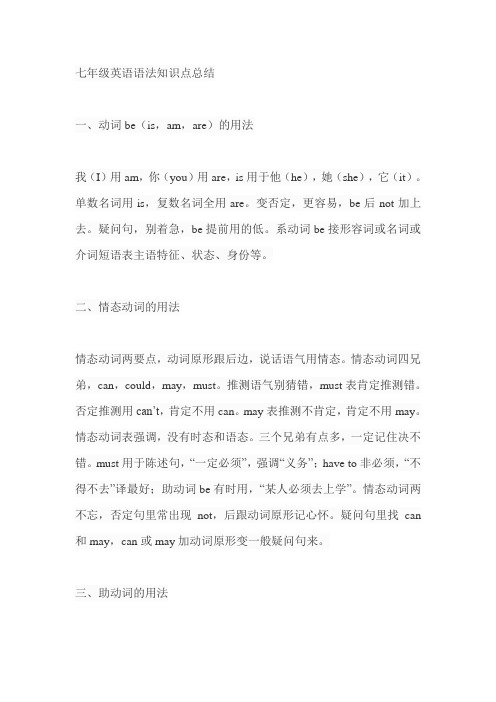
七年级英语语法知识点总结一、动词be(is,am,are)的用法我(I)用am,你(you)用are,is用于他(he),她(she),它(it)。
单数名词用is,复数名词全用are。
变否定,更容易,be后not加上去。
疑问句,别着急,be提前用的低。
系动词be接形容词或名词或介词短语表主语特征、状态、身份等。
二、情态动词的用法情态动词两要点,动词原形跟后边,说话语气用情态。
情态动词四兄弟,can,could,may,must。
推测语气别猜错,must表肯定推测错。
否定推测用can’t,肯定不用can。
may表推测不肯定,肯定不用may。
情态动词表强调,没有时态和语态。
三个兄弟有点多,一定记住决不错。
must用于陈述句,“一定必须”,强调“义务”;have to非必须,“不得不去”译最好;助动词be有时用,“某人必须去上学”。
情态动词两不忘,否定句里常出现not,后跟动词原形记心怀。
疑问句里找can 和may,can或may加动词原形变一般疑问句来。
三、助动词的用法五助分别是帮助、构成动词进行体和完成体及将来时三种时态助动词be的用法:be动词用法要牢记,I用am,you用are,is用于他(he)她(she)它(it)。
遇到单数用is,复数都用are。
变否定很容易,be后not加上去。
疑问句,别着急,be提前用的低。
系动词be接形容词或名词或介词短语表主语特征、状态、身份等。
助动词do的用法:do用在实意动词前表强调(用于肯定句);did用在过去式中;doesn用于第3人称单数代词前构成否定祈使句和反意疑问句。
Don’t+动词原形构成否定祈使句;助动词have的用法:have用于实意动词表拥有某物;has用于第3人称单数表某物为某人所有;have to表必须学会表必须;助动词will的用法:will用于将来时态的陈述句中;would用于过去将来时态的陈述句中;will/would用于构成否定句和疑问句;助动词can的用法:can用在实意动词前表示能力;用于否定句和疑问句中表猜测可能;助动词should的用法:should表应该应该表义务should have done过去应该做某事却没做shouldn不应该(与should have done区分记忆);助动词may的用法:may表推测可能表请求或许可may have done过去或许做了某事(而现在不知道)表示推测可能性最大;助动词must的用法:must表必须必须表推测必须会mustn’t禁止禁止表禁止推测不正确must have done过去一定做了某事表示推测过去一定做了某事正确性最大。
七年级英语必考12大语法点,全

七年级英语必考12大语法点,全一. 动词be(is,am,are)的用法我(I)用am, 你(you)用are,is跟着他(he)、她(she)、它(it)。
单数名词用is,复数名词全用are。
变否定,更容易,be后not加上去。
变疑问,往前提,句末问号莫丢弃。
还有一条须注意,句首大写莫忘记。
二. this,that和it用法(1)this和that是指示代词,it是人称代词。
(2)距离说话人近的人或物用this, 距离说话人远的人或物用that。
如:This is a flower. 这是一朵花。
(近处)That is a tree. 那是一棵树。
(远处)(3)放在一起的两样东西,先说this, 后说that。
如:This is a pen. That is a pencil. 这是一支钢笔。
那是一支铅笔。
(4)向别人介绍某人时说This is…, 不说That is…。
如:This is Helen. Helen, this is Tom. 这是海伦。
海伦,这是汤姆。
(5)This is 不能缩写, 而That is可以缩写。
如:This is a bike. That’s a car. 这是一辆自行车。
那是一辆轿车。
(6)打电话时,介绍自己用this, 询问对方用that。
如:—Hello! Is that Miss Green? 喂,是格林小姐吗?—Yes, this is. Who’s that? 是的,我是,你是谁?注意:虽然汉语中使用“我”和“你”,但英语中打电话时绝不可以说:I am…, Are you…?/Who are you?(7)在回答this或that作主语的疑问句时, 要用it代替this或that。
如:①—Is this a notebook? 这是笔记本吗?—Yes, it is. 是的,它是。
②—What’s that? 那是什么?—It’s a kite. 是只风筝。
七年级英语语法知识点归纳总结
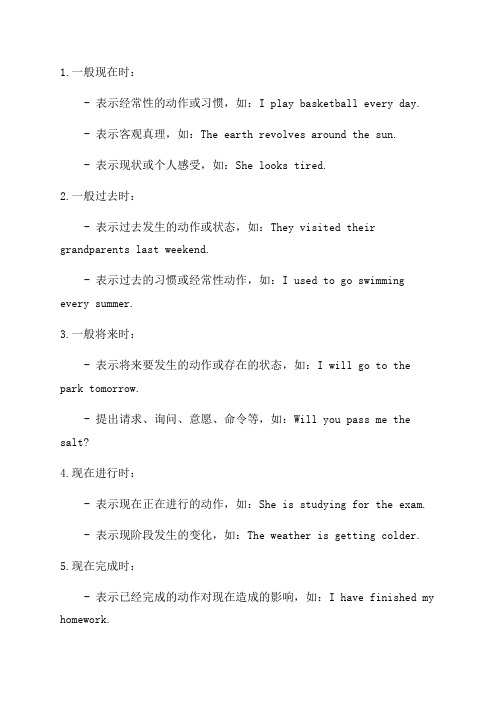
1.一般现在时:- 表示经常性的动作或习惯,如:I play basketball every day.- 表示客观真理,如:The earth revolves around the sun.- 表示现状或个人感受,如:She looks tired.2.一般过去时:- 表示过去发生的动作或状态,如:They visited their grandparents last weekend.- 表示过去的习惯或经常性动作,如:I used to go swimming every summer.3.一般将来时:- 表示将来要发生的动作或存在的状态,如:I will go to the park tomorrow.- 提出请求、询问、意愿、命令等,如:Will you pass me the salt?4.现在进行时:- 表示现在正在进行的动作,如:She is studying for the exam.- 表示现阶段发生的变化,如:The weather is getting colder. 5.现在完成时:- 表示已经完成的动作对现在造成的影响,如:I have finished my homework.- 表示发生在过去,但与现在有关的动作或经验,如:She has been to Paris.6.一般过去时与现在完成时的区别:7.现在完成进行时:- 表示过去开始,一直持续到现在的动作,如:He has beenplaying football for two hours.- 表示过去一段时间内的连续动作,如:I have been studying English since last year.8.情态动词:- 表示说话人的推测、猜测,如:He might be at home.- 表示能力、许可、必要性等概念,如:You can swim in the pool.- 表示建议、命令、请求等,如:You should eat more vegetables.9.及物动词与不及物动词:- 及物动词后面需要跟宾语,如:I eat an apple.- 不及物动词后面不需要跟宾语,如:He runs fast.10.名词:- 表示人、物、地方、抽象概念等,如:I have a book.- 可以用来做主语、宾语等,如:Playing tennis is fun.11.形容词与副词:- 形容词用来修饰名词,如:She is a beautiful girl.- 副词用来修饰动词、形容词、副词等,如:He runs fast.12.比较级与最高级:- 表示两者之间的比较,用比较级,如:She is taller than me.- 表示超过两个以上的比较,用最高级,如:He is the tallest boy in the class.13.代词:- 人称代词表示说话人、对话人或被谈论的人,如:I, you, he, she, it, we, they.- 物主代词表示所有关系,如:mine, yours, his, hers, its, ours, theirs.- 反身代词表示动作的反身性,如:myself, yourself, himself, herself, itself, ourselves, themselves.14.特殊疑问句:- 对疑问词进行提问,如:What is your name? Where do you live?15.间接引语:- 把别人的话转述成自己的话,如:He said that he was tired.这些是七年级英语语法的一些基本知识点,掌握好这些知识点可以帮助同学们更好地理解和运用英语。
- 1、下载文档前请自行甄别文档内容的完整性,平台不提供额外的编辑、内容补充、找答案等附加服务。
- 2、"仅部分预览"的文档,不可在线预览部分如存在完整性等问题,可反馈申请退款(可完整预览的文档不适用该条件!)。
- 3、如文档侵犯您的权益,请联系客服反馈,我们会尽快为您处理(人工客服工作时间:9:00-18:30)。
七年级上英语语法大全1.All the time =always2.The weather in XXX is warm all the time=The weather in YYY is always warm.3.Take a sauna (蒸桑拿) enjoy hot spring(泡温泉)4.Sunny=fine=clear=bright=dry5.What was the weather like yesterday? = How was the weather yesterday?6.What will the weather be like tomorrow? = How will the weather be tomorrow?7.What is the weather like today? = How is the weather today?8.Fall(落下);((价格)下跌);(跌倒). Blow(吹起);(飘扬);(吹灭)9.Weather- 天气;经历(挫折)whether=if10.An outing in spring=a spring outing11.Like ⋯⋯better than ⋯⋯=prefer ⋯⋯to ⋯⋯12.I can swim.-I can swim,too. =Me,too. =So can I.13.My room gets cold easily.-So does mine-(my room)14.All of class C students will go for an spring outing beside /except Tom.15.Besides ⋯⋯除了(⋯⋯.包)(括⋯⋯) except 除⋯了.⋯. (⋯.不)(包括⋯⋯)16.Beside=next to17.It 's a good time to do sth. /It 's a good time for sth.18.It 's名+词短语+ to do sth. It 形容'词s + to do sth.19.被动语态基本结构:be + 动词的过去分词20.You saw the stars last night. = The stars were seen last night.21.You see the stars every night this month. = The stars are seen every night this month.22.You will see the stars tonight. = The stars will be seen tonight.23.You have seen the star already. = The stars have been seen already.24.分子基数词,分母序数词,分子大于1,分母加s25.3/4 = three quarters = three-fourths 1/2 = a half = one half26.Start = set off = set out =leave27.Hundreds of = hundreds of thousands of28.More than = over right = correct29.Rise后不加名词,raise后加名词30.The soldier rose and fired. The soldier raised the gun and fired himself.31.A room of your own = your own room32.On your own(靠自己的能力) = yourself33.See sb. do sth.(看见某人做过某事)34.Live on the earth(住在地球上) live on the meat(靠肉生存)35.Sick people=patient36.You'd better do动(词原形)sth. You 'd better n动o词t do原(形) sth.例句:You' d better not eat fish. You ' d better kill JIa first.37.Jia is too weak to go to school. = Jia is not strong enough to go to school. =Jia is so weak that he can ' t go to school.(so 的⋯句⋯子t中hat宾⋯语⋯不可以省略)38.English is too difficult for Jia to learn well. = English is not easy enough forJia to learn well. = English is so difficult that Jia can well. ' t learn it39.反身代词三种基本用法40.A. We enjoyed ourselves last night. 反身代词作宾语(动宾)Chen made a model plane for himself. 反身代词宾语(介宾)B. The students themselves decorated the classroom. 反身代词作同位语(起强调作用)(主语+同位语)= The students decorated the classroom themselves. 反身代词作同位语(起强调作用)(同位语在句末)C. I 'm not quiet myself these反d身ay代s. 词作表语(be 动词后)41.I haven 't taken my temperature yet.(y用et于现在完成时的疑问句和否定句的句末)42.Sick note = sick leave note look out = be careful43.Need 的两种词性和用法A.need +动词原形+ sth. needn 动词'原t形+ + sth.B.Need + to do + sth. Need + sth.Don' t/does 't need + to do + sth. Don ' t/does 't need + sth.44.She has a cold. (现在式)- She had a cold. (过去式)She has got a cold. (现在式)- She had got a cold. (过去式)She gets a cold. (现在式)-she got a cold. (过去式)45.In hospital(住院) in the hospital(在医院里) go to school(上学) go to the school(去学校)46.当well 解释为身体好时well 就是一个形容词.47.The ill boy(错误) the sick boy(正确)48.Be in good health(n.) = keep healthy(a.)49.What' s your weight? = How much do you weigh?50.I 'm XX kg. = I weigh kXgX.51.Go on a diet = be on a diet52.Be fond of = care for = like53.Prefer sth. to sth. Prefer doing sth. to doing sth.54.Instead of doing sth./sth./ 介词短语(P.P)55.Instead 解释为代替时用在句首或句末56.Not at all 例句:I do not like smoking at all. (和You'd better not do sth有. 区别)57.Lose balance的反义词是keep balance58.However 和but 的区别:however 后有逗号. 例句:However, we fall illsometime.59.Because of 后加名词;because 后加完整的句子. 例句:She is absentbecause of her illness. = She is absent because she is ill.60.Cause 有两种词性——n.和v.例句:The illness is the cause of her absence. = Her illness causes her absence.61.系动词+形容词. 如:feel well. look beautiful.a62.辨析must 和have to Must 是主观上愿意的 e.g. She is such a nice person.You must meet her.Have to 是有被迫的意思,是主观上不愿意的 e.g. It 's cold. You have to wear moreclothes.63.It's a guide to sth是. ⋯⋯的指南64.Help sb. (to) do sth. Help sth. (to) do sth.65.Advice 不可数,只能说 a piece of advice.66.Have to 后加动词原形advise sb. to后加动词原形67.Make sb. do sth. Make sth. + adj.68.It 's no use doing sth做. ⋯⋯是没用的69.Fail to do = don 't do = be not able to do = don 't manage to do例句:Justin Bieber failed to win the Grammy Award.=Justin Beiber wasn 't able to win the Grammy Award.=Justin Beiber didn 't manage to win the Grammy Award.=Justin Beiber couldn ' t win the Grammy Award.70.Upset= unhappy Upset =worried(这两个同义词代表upset 的两个不同解释)71.一些关于surprise 的句子It 's a (surprise). (n.) The gift is (surprising). (令a.人)( 惊喜的)What a (surprise)! (n.) She is (surprised) at the gift. (a.)(感到惊喜的) The gift (surprised) her. (v.)72.Either 的三种解释A.也不例句:Jia doesn't come to school. Yuan doesn 't, either.B.两者中其一例句:There 's tea or coffee. You can have, either.C.或者例句:You can have either tea or coffee.73.Both my father and mother are teachers. = Both of my parents are teachers.Neither my father nor my mother is a teacher. = Neither of my parents is a teacher.74 . As + adj. +asAs + adv. + as75 . Not as ⋯⋯as = not so ⋯⋯as76 . Dick doesn 't swimfa asstas Julia.(正确)Dick swims not as fast as Julia. (错误)77.My cousin spends money as much as my aunt.(口语化)=My cousin spends as much money as my aunt.(正式的)78.She' s more nercous than him.=She isn ' t as nervous as h最e好r.( as⋯⋯a后s加宾格)=She isn 't as nervous as( sish)e.(as ⋯⋯主a格s + + 动词(be动词也可)主格后的动词在口语中省略)79.Think sth. as sth. (认为⋯⋯是⋯⋯)80.in 1999 on + (date)(日期——具体一天) in + morning之类on + 修饰语+=Justin Bieber didn t win the Grammy Award.morning之类81.关于everyone 的几句例句Everyone is here.himself. (Everyone )主( 语) must do (his )(代词——代主语) homeworkHelp yourselves to some fish, everyone.82. Don ' t be late 是 祈使句,不是感 叹 句 . (注意 be )83. (Have/make/let )( 谓语 )(sb.)(宾语)(do )(宾语补 足语)sth.(Advise/ask/tell/want )( 谓语 )(sb.)(宾语)to (do )(宾语补 足语) 时态、三单一的变化只在 谓语上做变化84. I have a stomachache. -Have you?(错误 )-Do you?(正确 )I have failed the exam. -Have you?(正确 ) -Do you?(错误 )85. like to do better than to do like doingbetter than doing86. 在疑 问句中,如果 问者希望得到肯定的回答 则疑问 句中的 some 不 变成 any87. leave-be away (from)( 加不加 from 要看具体句子中的情 况)88. 几组 顺接动词 和延续性动词Borrow –keep finish-be over join-be in join-be a member ofDie-be dead fall asleep-be asleep catch a cold-have a coldBegin-be on catch-have89. Be afraid of (害怕 )90. Turn/become/go/get + 形容词 这四个词 都解释为变 得91. (Plenty of )(一般用于肯定句中 )=(enough )(一般用于否定句、疑 问句中 )92. High-height (n.)( 高度 )93. Quiet/still/only/just + a few/a little94. So/very/too + few/little95. Failed 不是否定 词96. 一般来说,一个单词只有否定的含 义,那么这个词 就是否定 词. 例外: little, few, prefer doing to doing prefer sth. tosth. 疑 问 句形式: Do you have a stomachache?疑 问句形式: Have you failed the exam?scarcely, seldom, hardly, rarely, barely97.Go to the dentist (去看牙医)(一般不用Go to the dentist 而用'Gso, to the dentist)98.Wear 和put on 的区别:wear 是一种状态,put on 是一时的动作例句:In such coldweather, I wear my overcoat all day.I shall put on my overcoat before go out.99.没有insteaded of100.Friendly-friendlier101.try to do sth. 尽力做某事try doing sth. 尝试做某事102.Every family owns a television.103.It 's形+ + to do sth. 做某事很⋯⋯(It)(形式主语) is surprising to (hear from her)(主语).=(To hear from her)(主语)(is)(谓语)(surprising)(表语).104.listen to sth.105.How excited he was to see her again.(强调excited) = He was execited to see her again.106.fond it + 形+ to do sth.发现做某事很⋯⋯107.remember doing 回忆已经做过的事remember to do 想起要去做的事108.happen to do sth. 碰巧做某事keep from doing sth.防止不要做某事109.such as + 名词110.She's never late for school,is she. She 's never been late for school,has she.111.help sb.(to) do sth. help yourself(yourselves)to sth.112.The boy is taller than any other boy in his class.The boy is taller than any girl in his class.113.How important (water)(主语)(is)(谓语) in our life!What lovely weather (it)(主语)(is)(谓语)!What great fun (it)(主语)(is)(谓语)!What a good time (we)(主语)(are)(谓语) having today!变成陈述句:We' re having a goo dtime today.How quickly (he)(主语)(is)(谓语) running!How excited (he)(主语)(was)(谓语) to see his mother! 变成陈述句:He wasexcited to see his mother.114.He didn 't lose any weight=He failed to/wasn 't able to/couldn ' t/didn ' t/didn 't managed to lose any weight. 115.sound 后一定加形容词116.He looks angry. He looks angrily at me.117.so beautiful rice(错误)such beautiful rice(正确)118.so + 形容词+名词such +名词短语119.(f you want to keep fit)(if 引导的从句,一般现在是),(you will have a healthy diet)(主句,一般将来时)120.错题集:Let 's go and help hiamc ross the road.121.Someone is is singing in the next door.122.May I keep these books for a week?123.I didn 't know gthr e w rice in France124.mouse-mice125.be different from126.We shall be landing shortly.(此处用landing 是为了强调时间持续长)127.About two-thirds of the workers in the factory were born in the (1970s)(二十世纪七十年代)128.while 当(⋯⋯一)(段时间)时候when当(⋯⋯一.)(个时间点)时候129.We can use the computer to typing in information.(我们能用电脑输入信息)130.There is not water or air in space.131.Does anything move around the Earth?132.Geroge usually has more fun in summer.-So do I.只有have/has 解释为”有”或是现在完成时的一部分时,用So have I. have/has解释为”有时,用So do I 和So have I.都可133.独自的,单独的(by oneelf/on one 's own)134.生病(fall ill)135.We need plenty of food every day(改为一般疑问句)-Do you need enough food every day?136.I lived in New York and Chicago,but don ' t like either city very much.137.在寒冷的天气中:in cold weather138.The long holiday is a good time to get some exercise.139.I 'm afraid you can 't eat too much junk food.Yoeur eat less. 'd bett140.There is nothing wrong with Kate , is there?141.That 's O.K. =You are welcome=My pleasure=It 's a pleasureAll right.=O.K.That 'a s ll right.=It doesn 't matter.=never mindThat 's right.=That 's correct.142.Dream of doing sth. / sth.143.Make sb. ' s dream come true=realize sb. ' s dream144.Lose the chance失去机会take/catch/hold the chance 抓住机会145.一个句子里只能有一个连词146.See sb. do sth.看见某人经常做某事147.Think over sth. 仔细地想某事think about sth. 想某事148.We don 't know when to start.I haven't decided which on to choose.Plea se tell me how to work out the problem. 及物动词+特殊疑问词+动词过去式149.Go on with sth. = go on doing sth.150.We do need money. 中的do 起强调作用151.Make/let/have (sb. do) ask/tell/help/want/invite/advise (sb. to do) 这里的do 都是动词原形152.At the age of eight = when they were eight153.He hurried to the school. = He went to the school in a hurry. = He went to the school hurriedly.154.What do sb. look like? 问外貌What is sb. like?问品质What is he? 问职业155.Please don't say so 请不要谦虚了156.Get/be used to sth. 习惯于某事be used to doing sth.习惯于做某事used to do sth. 过去常常做某事157.Humor = humour158.Walk/go onto the stage 走上舞台go into the car 走进汽车里159.Give sth. to sb. = give sb. sth. award sth. to sb. = award sb. sth.160.Bank think among中的“ n发”音为[?] “n在”k , g后发[?]161.Tom neither smokes nor drinks. Neither ⋯nor ⋯连接谓语(人称遵照就近的主语) Theyare interested in neither the short play nor the comic dialogue. 连接宾语Alice isneither fat nor thin. 连接表语(be+表语)Neither Lily nor I am good at English. Neither his teacher not he likes the art festival, 连接主语162.Hold our “Little Oscars” = have our “Little Oscars”163.We held our “Little Oscars” last night.= “Little Oscars ” was held (by us) last night.= “Little Oscars ” took place last night.164.First-then First-after that First-next First-second First-secondlyFirst-in summary First-also First-besides First-finally First-at lastFirst-in summary First-in the end165.Put on 穿(衣),上演put up 举起,建造,张贴put out 扑灭(火) put off 推迟166.Present=award167.Be proud of= take pride in168.Have a break=have a rest169.Try to do try not to do170.He fell ill yesterday. He felt sick yesterday.171.Neither nor 就近原则172.Be amused at/by sth.173.Audience is/are ⋯174.Act as = perform175.Award sth, to sb. = award sb. sth. give sth. to sb. = give sb. sth.176.Get out of hand 失控comments of sth.对⋯⋯的评价through the TV 通过电视 A record of 一个⋯⋯的记录Youth League 共青团five-star red flag 五星红旗Stand for⋯代表⋯⋯nation 国家177.Practice (n.) makes perfect. 熟能生巧178.Congratulate sb. on sth.179.Encourage sb. to do sth.180.Sb. is the first/last to do sth,181.Luckily, I passed the exam.182.Good luck = Wish you good luck183.Enter for/ take/take part in/attend/join/enter/join in eg. Take the exam(唯一的用take 表示参加的短语) enter for 报名参加take part in= join in 参加活动attend 参加,出席(会议)join 加入、参加组织或人群enter 进入,参加enter the war184.Break in闯入, 打断, 使驯服, 训练成为break out 爆发,突然出现;逃脱,逃走break down vt.打破, 减轻, 把 ... 分解 vi.彻底失败 , 崩溃, 停止运转, 坍塌, (数据、观点等)站不住脚185.Practise doing sth.186.On the sports day at the sports meeting187.XXX is twice taller than YYY=XXX is twice as tall as YYY=XXX is twice YY'Ys height188.Enjoyable 中的en 是前缀,able 是后缀前缀一般使词义变化后缀一般使词性变化189.Win first prize = come in first190.He works hard = He is hard-working.191.Stay in bed 卧病在床stay in the bed 在床上192.Be interested in 后一般加sth.,不是sb.193.Adj. /adv. Enough to do sth. 太⋯⋯以至于能够做某事Not adj. /adv. Enough to do sth. 太⋯⋯以至于不能够做某事too adj. to do sth. 太⋯⋯以至于不能够做某事sb. so adj. that sb. can do sth.某人太⋯⋯以至于能够做某事sb. so adj. that sb. can't do sth.某人太⋯⋯以至于不能做某事194.The oldest man 最老的人表示这个人还活着195.Hope sb.+ 宾语从句wish sb. to do/wish sb.+宾语从句196.。
